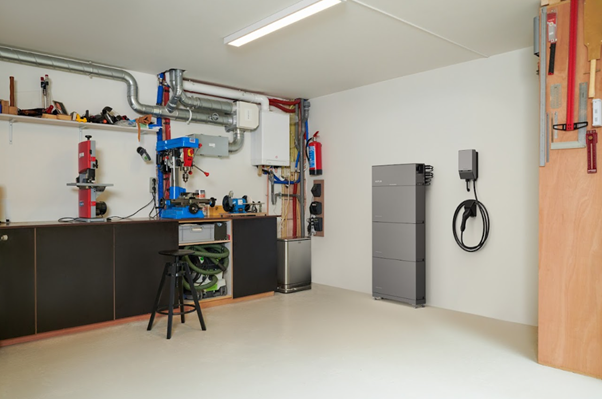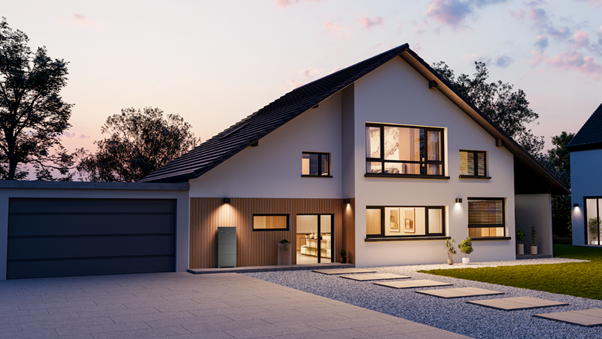How to Make Your Home More Energy-Efficient
With the rising energy costs in the UK, improving your home’s efficiency is more important than ever. Whether you're looking to cut down on heating bills, install renewable energy solutions, or upgrade your appliances, you can take plenty of simple and effective steps to start saving now.
This guide will help you make informed choices to reduce waste and save money, from insulation and smart thermostats to draught proofing and energy-efficient lighting.
Read on to learn how to transform your home into a more energy-efficient and cost-effective space.
How Energy-efficient Is Your Home?
With the ever-rising energy prices in the UK, now has never been a better time to increase your home’s efficiency and save money.
Every home sold or rented in the UK must have an Energy Performance Certificate, which is rated on a scale from A to G, with A being the most efficient and G being the least. The UK government requires all private landlords to meet an EPC rating of C or equivalent by 2030.
You may not have an energy efficiency rating if you have lived in the same home for a long time. However, you can request an assessment.

How Can You Improve Your Home’s Energy Efficiency?
While having your home assessed can help you understand what you can improve, you can take the following steps to improve your efficiency, with or without a rating.
Check Your Thermostat
One big way to save money immediately is by managing your thermostat better. Turn down the temperature to the lowest comfortable setting. If you feel chilly, put on a jumper to warm yourself rather than heating your entire house more.
You should also turn down the thermostat at night and when you leave the house, and turn down the radiators in rooms you don’t use very often. Using a smart thermostat can make all of this much easier.
Upgrade Your Boiler
Old boilers are much less efficient than newer models, which almost all now have the best A energy rating compared to the G rating older ones typically have. While investing in a new boiler will cost money, it will save you about £340 a year on your gas bill and significantly reduce your carbon footprint.
Insulate Your Home
Insulating your house better can significantly improve its efficiency. It allows it to hold heat better, reducing the need and cost of heating. It will also reduce the cooling cost in the summer and improve your property value. Here are a few different insulation options to consider.
Loft insulation is critical since if your loft, attic, or flat roof is not insulated properly, about one-quarter of your heat will be lost through the roof. Mineral wool between the joists is typically recommended, and treated cellulose or polyurethane foam can be used in those hard-to-reach places.
Solid wall insulation helps address the heat loss common in older homes with solid masonry walls. It can be fixed by attaching insulation boards to the internal walls or fixing insulating material to external walls and finishing it with render or cladding. Building regs are required if you are insulating more than 25% of your external walls.
Cavity wall insulation is essential in houses with spaces between inner and outer walls. It can be done relatively quickly and easily by drilling holes in the wall and injecting insulation into them, but it also requires building regulations approval.
The final type of insulation to consider is in the floors. While the heat loss through the lower floor is low compared to the roof and walls, it still helps. It may not be necessary if you have a newer concrete ground floor.
However, if you have suspended timber floors, lift the carpet and floorboards and lay mineral wool insulation between the joists. Also, if you have gaps in those floorboards, seal them before you put your carpet back down.
Use a Smart Meter
Smart meters and In-Home Displays (IHD) are now standard in the UK, with many people already having them. However, if you do not yet have one, contact your energy supplier to request one; there is no up-front cost to pay. Smart meters help you monitor your power consumption, such as when it was used, how much you used it, and how much it cost.
It’s essential for saving money with the rising tariff rates in the UK, especially for those on a variable time-of-use tariff. They also allow you to have better control over your heating by adjusting timings and settings even while you are not home using their mobile app.
Install a Solar System
Installing solar panels will greatly improve your efficiency since they can significantly reduce your reliance on the grid. With a large enough array, you can even go off-grid entirely. Using a solar battery storage system is essential whether you choose on- or off-grid setups. It will ensure you have power if the grid goes down and allow you to use solar at night or during bad weather.
You can also use batteries instead of grid power during those peak electricity hours when tariffs are the highest, saving you significant money. Finally, many of us work outside the home during the day when the sun shines. You cannot take full advantage of using your free solar power if you are not home during the day unless you have a battery storage system installed.
The EcoFlow PowerOcean (Single-Phase) and the EcoFlow PowerOcean (Three-Phase) start at 5kW, the perfect size for a home backup system. They are also expandable with additional batteries up to 45kW for those with large homes wanting to go off-grid. If you already have solar panels installed, you can use the EcoFlow PowerOcean DC Fit to easily retrofit your existing solar panel system and add solar battery storage.
Simply connect it between your photovoltaics and your existing inverter without altering your system. It allows you to maximise the benefits of your photovoltaic array. If you are unsure what to do, book a free consultation to help you decide which products are best for you.
Home Energy Management System (HEMS)
Using a home energy management system alongside your solar system will make it even more efficient. It gives homeowners more control over their power by allowing them to adjust everything in real-time via mobile apps. It also lowers your electricity and heating bills by 30-70%.
Your HEMS will also help further reduce your emissions and environmental impact. For instance, the EcoFlow Power Insight allows you to monitor your solar output, batteries, EV charger, and even smart plugs using an LED display or optional mobile app for control when you are not home.
Install Double or Triple-Glazed Windows
If you still have old single-glazed windows, you lose significant heat through them. Double or even triple-glazed windows cost more upfront, but they can save you a lot of money in the long run. They also reduce external noise and offer better protection from the outside elements. If you replace your windows, you will need approval from building regulations unless you use a registered installer.
Draught Proofing
Sealing your home against draughts is one of the easiest and cheapest things to improve efficiency. It involves filling in gaps around doors, windows, hatches, cracks, and exposed pipes where air can enter your home. You can purchase products at your local ironmonger or DIY store and install them yourself with little effort. Permits are also not required. Here are some things you can buy to draught-proof your home today:
● Silicone sealant
● Self-adhesive foam strips
● Flexible fillers
● Metal or plastic strips with brushes or wipers
● Shaped rubber or plastic fillers
● Expanding polyurethane foam for large gaps
Install a Heat Pump
The purpose of heat pumps is to capture heat from the outside and move it into your home. While they do use some electricity to operate, the amount of heat you will gain will be far more significant than the electricity it consumes., The best way to do this is alongside your solar system and use solar to operate the heat pump for even better efficiency.
For instance, the EcoFlow PowerHeat Air-to-Water heat pump will use electricity to bring ambient air heat into your home. Integrating this with your EcoFlow PowerOcean (Three-Phase) brings even greater energy independence and savings.
Switch to Energy Efficient Appliances and Lighting
If you have any old incandescent bulbs, you should change them to LED bulbs immediately. LEDs are 75 - 90% more efficient than incandescent and 25-35% better than compact fluorescent bulbs.
We already discussed the importance of upgrading your boiler, but you should also consider your other appliances. Old washers, dryers, fridges, freezers, and dishwashers should be replaced if they don’t have an energy rating of C or better.

Frequently Asked Questions
What Saves the Most Energy in a House?
On average, heating and cooling accounts for 40-50% of all household energy use. Therefore, upgrading your heating system will save the most energy. Also, insulate your walls, roof, and floors, and seal your windows, doors, and any exposed cracks where air can enter.
Final Thoughts
Improving your home’s energy efficiency doesn’t have to be overwhelming. Simple changes like better insulation, draught-proofing, and switching to LED lighting can make a huge impact with little effort.
For even better savings, consider upgrading to a smart meter, installing solar panels with battery storage like the EcoFlow PowerOcean (Single-Phase), switching to an energy-efficient heating system, and installing an air-to-water heat pump. Investing in these improvements reduces your monthly bills and contributes to a greener, more sustainable future. Take control of your home's efficiency today and start saving.



